动词的分类及时态
动词分类和时态
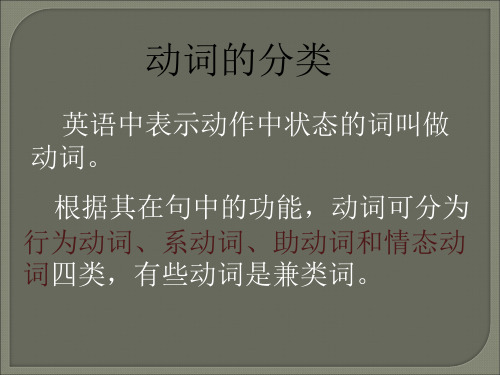
最常用的助动词及其用法
1. do(does,did)用于一般时态
你通常早上六点钟起床吗? (一般现在时,一般疑问句 ) Do you usually get up at six o’clock in the morning?
汤姆昨天和谁去了图书馆?
实义动词
实义动词又称行为动词,本身具有比 较完整的意义,能够在句中单独充当句 子成分。 实义动词可分为及物动词(Transitive Verb)不及物动词(Intransitive Verb), 缩写形式分别为vt. 和vi.。
及物动词要加宾语才能使其意义完整; 而不及物动词后无须宾语,其本身就能表达 完整的意思。 我想要一本新字典. I want a new dictionary. That baby is crying. 那个婴儿正在哭. 不及物动词后需要接宾语时,要在其后 加上一个合适的介词。 Please listen to the 请认真听老师讲! teacher carefully! 有的实义动词既可做vt也可作vi. Jenny is studying French. Jenny is studying at No.3 Middle School.
语法互动(九) ┃ 动词词组及词义辨析
2.come to oneself(苏醒), ____________________( 实现), come true come out(花开;发芽;出现;出来;出版;发表), come over(过来;顺便来访), come on ____________________( 来吧;跟着来;赶快), clean up(把……打扫干净), cheer up(使高兴起来), consist of(由……组成), come up with(提出,想出)
初中英语动词时态分类和经典例句
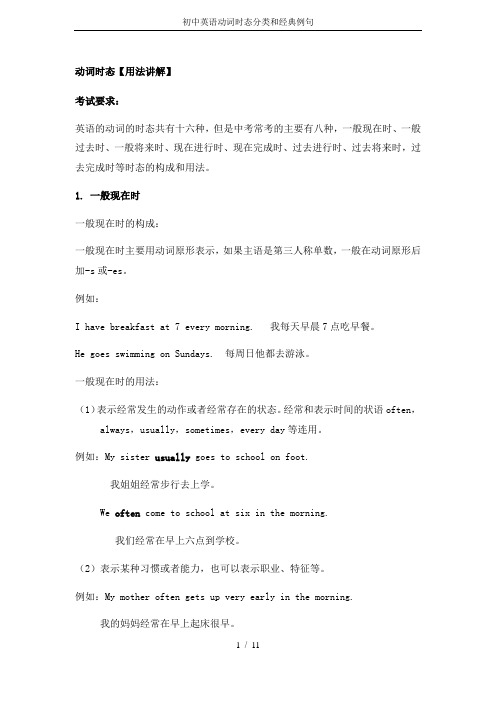
动词时态【用法讲解】考试要求:英语的动词的时态共有十六种,但是中考常考的主要有八种,一般现在时、一般过去时、一般将来时、现在进行时、现在完成时、过去进行时、过去将来时,过去完成时等时态的构成和用法。
1. 一般现在时一般现在时的构成:一般现在时主要用动词原形表示,如果主语是第三人称单数,一般在动词原形后加-s或-es。
例如:I have breakfast at 7 every morning. 我每天早晨7点吃早餐。
He goes swimming on Sundays. 每周日他都去游泳。
一般现在时的用法:(1)表示经常发生的动作或者经常存在的状态。
经常和表示时间的状语often,always,usually,sometimes,every day等连用。
例如:My sister usually goes to school on foot.我姐姐经常步行去上学。
We often come to school at six in the morning.我们经常在早上六点到学校。
(2)表示某种习惯或者能力,也可以表示职业、特征等。
例如:My mother often gets up very early in the morning.我的妈妈经常在早上起床很早。
This kind of car runs very fast.这种小汽车跑得非常快。
(3)表示客观事实、客观规律或者客观真理。
例如:This kind of trees never grows in the desert.这种树从来不在沙漠里生长。
Do you know that knowledge is power?你知道知识就是力量吗?(4)在时间、条件、让步等状语从句中,表示将来的动作。
例如:They’ll be so happy when I tell them.我告诉他们时,他们会很高兴的。
If you aren’t here on time tomorrow, I’ll write to your parents.如果你明天不准时到,我就给你父母亲写信。
动词用法词典

动词用法词典一、引言动词是语言中的重要成分之一,用来表示行为、状态或动作的发生。
动词的用法十分丰富多样,包括时态、语态、情态、短语动词等。
本词典旨在整理和解释常见动词的用法,以帮助读者更准确地理解和运用动词。
二、动词分类1. 情态动词情态动词表示说话人的看法、态度、愿望、建议、命令等,例如can, could, may, might, must, shall, should, will, would等。
2. 及物动词及物动词需要有宾语才能构成句子的完整意义,例如eat, write, teach, help等。
3. 不及物动词不及物动词不需要宾语就能表示完整的意思,例如sleep, laugh, swim, run等。
4. 及物不及物动词有些动词既可以作及物动词使用,也可以作不及物动词使用,例如fall, move, open, break等。
5. 链接动词链接动词用于连接主语和表语,表示主语的状态、特征、属性等,例如be, become, seem, feel, look等。
三、动词时态1. 现在时表示现在或经常性的动作或状态,常用于真理、生活常规等情境,例如I play tennis every Sunday.(我每个星期天都打网球。
)2. 进行时表示正在进行的动作或状态,常用于描述当前正在进行的动作或者强调持续性,例如She is reading a book.(她正在看书。
)3. 过去时表示过去发生或存在的动作或状态,常用于回忆、故事叙述等情境,例如I visited Europe last summer.(我去年夏天去过欧洲。
)4. 完成时表示在过去某个时间已经完成的动作或状态,常用于对比过去与现在的情况,例如She has already finished her homework.(她已经完成了作业。
)5. 未来时表示将来要发生的动作或状态,用于描述将来的计划、安排等,例如I will go to the supermarket tomorrow.(我明天要去超市。
初中英语动词时态分类及例句
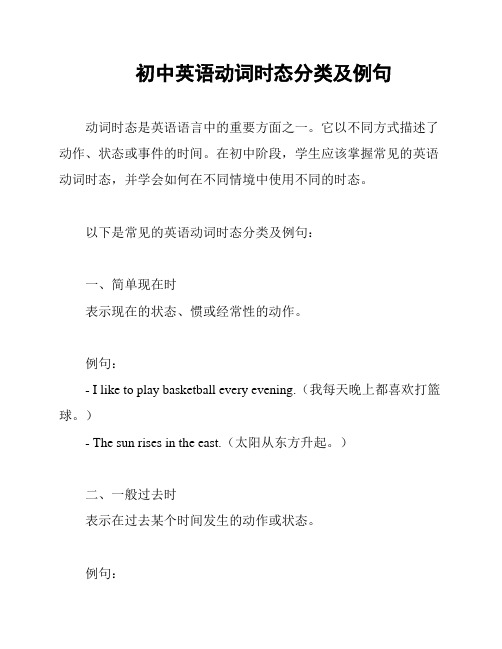
初中英语动词时态分类及例句动词时态是英语语言中的重要方面之一。
它以不同方式描述了动作、状态或事件的时间。
在初中阶段,学生应该掌握常见的英语动词时态,并学会如何在不同情境中使用不同的时态。
以下是常见的英语动词时态分类及例句:一、简单现在时表示现在的状态、惯或经常性的动作。
例句:- I like to play basketball every evening.(我每天晚上都喜欢打篮球。
)- The sun rises in the east.(太阳从东方升起。
)二、一般过去时表示在过去某个时间发生的动作或状态。
例句:- He walked to school yesterday.(昨天他步行去学校了。
)- I visited my grandparents last summer.(我去年夏天拜访了我的祖父母。
)三、现在进行时表示现在正在进行的动作。
例句:- They are watching a movie now.(他们现在正在看电影。
)- She is studying in the library at the moment.(她现在正在图书馆研究。
)四、过去进行时表示过去某个时间正在进行的动作。
例句:- She was teaching in the classroom at 2 pm yesterday.(昨天下午2点她正在教室里上课。
)- I was studying when he called me.(他给我打电话的时候我正在研究。
)五、将来时表示将要发生的动作或状态。
例句:- They will go to Beijing next week.(他们下周将去北京。
)- I am sure she will like the present.(我确信她会喜欢这个礼物。
)六、过去完成时表示过去某个时间之前已经完成的动作。
例句:- She had finished her work by 5 pm.(下午5点她已经完成了她的工作。
动词的分类与动词的时态体
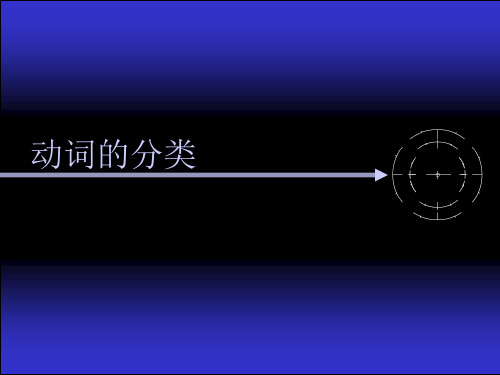
四、 单词动词和词组动词
英语中的主动词, 按其构成, 可分 为单词动词(single-word verb) 和词组 动词(phrasal verb)
词组动词
1) V. + prep. account for; agree with, agree to; amount to; come into; come across; get after; go about; go for; resort to;
动态动词
1) 表示持续动作的词 如drink, eat, fly, play, rain, read, run, sit, stand, sleep, talk, watch, write, work 等 ※ 这类动词可用于进行体,也可 以用于非进行体
2)表示移动或改变的动词 如arrive, become, change, come, get, go, grow, leave, reach, turn 等 ※ 这类词也是既可用于进行体, 也 可用于非进行体。
1) 用作主动词的 be 和 have (作“是” 或“有”的意思)。 2)如apply to(适用于), belong to, differ from, cost, weigh, measure, fit (适合), ble 等。
3)表示感觉的动词 如 feel, hear, see, smell, taste等
动词的分类
一、主动词和助动词
英语中的动词按其在构成动词词 组中所起的作用分为主动词(Main Verb) 和助动词(Auxiliary)两大类。 1. 主动词:构成动词短语的语义核 心,它表示动词词组的基本意义, 又叫实义动词(Notional Verb)
助动词
助动词无实际意义,只在句中起语 法功能的作用,帮助主动词构成疑 问、否定、时态和语态等形式。分 为:基本助动词、情态助动词和半 助动词三类。
初中语法 动词分类和时态
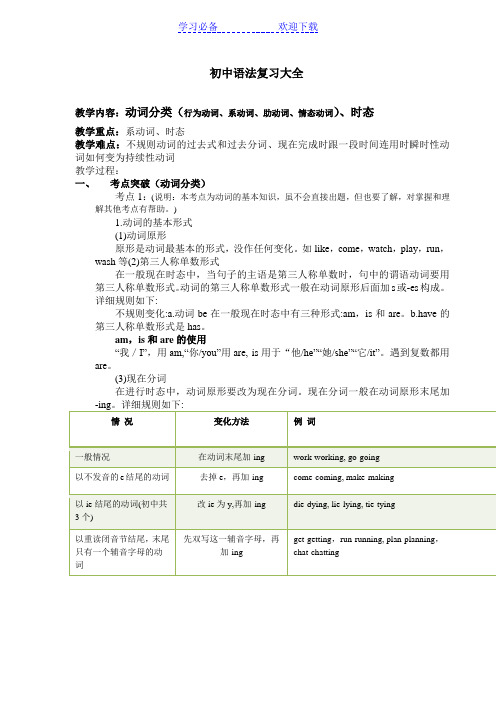
初中语法复习大全教学内容:动词分类(行为动词、系动词、助动词、情态动词)、时态教学重点:系动词、时态教学难点:不规则动词的过去式和过去分词、现在完成时跟一段时间连用时瞬时性动词如何变为持续性动词教学过程:一、考点突破(动词分类)考点1:(说明:本考点为动词的基本知识,虽不会直接出题,但也要了解,对掌握和理解其他考点有帮助。
)1.动词的基本形式(1)动词原形原形是动词最基本的形式,没作任何变化。
如like,come,watch,play,run,wash等(2)第三人称单数形式在一般现在时态中,当句子的主语是第三人称单数时,句中的谓语动词要用第三人称单数形式。
动词的第三人称单数形式一般在动词原形后面加s或-es构成。
详细规则如下:不规则变化:a.动词be在一般现在时态中有三种形式:am,is和are。
b.have的第三人称单数形式是has。
am,is和are的使用“我/I”,用am,“你/you”用are, is用于“他/he”“她/she”“它/it”。
遇到复数都用are。
(3)现在分词在进行时态中,动词原形要改为现在分词。
现在分词一般在动词原形末尾加(4)过去式在一般过去时态中,动词原形要改为过去式。
过去式一般在动词原形末尾加-ed。
详细规则如下:(5)过去分词在完成时态和被动语态中,动词原形要改为过去分词。
规则动词的过去分词同过去式。
2.及物动词和不及物动词( 统称:实义动词或行为动词)动词根据能否接宾语可分为及物动词和不及物动词。
如下表:考点2: 系动词、助动词课堂小测:( )1. (2011广东)This silk dress so smooth.It’s made in China.A.feelsB.smellsC.soundsD.tastes( )2. (2010广东)You cool!Are these your new sunglasses?A.tasteB.lookC.smellD.sound( )1. (2014潍坊)—What will a science museum be like if you are asked to build one? —I hope it will like a book.A.tasteB.soundC.lookD.smell( )2. (2014河北)Mom is cooking dinner.It so nice. A.smells B.tastes C.feels D.sounds( )3. (2014昆明)—The medicine awful.I can’t stand it. —I know, Jimmy.But it’s helpful for you.A.tastesB.eatsC.drinksD.takes( )4. (2014湖州)Listen, the country music so sweet. A.smells B.sounds C.feels D.looks考点3:情态动词1.情态动词的类型①只作情态动词的有:must ;can(could);may(might);②可作情态动词也可作实义动词的有:need;③可作情态动词也可作助动词的有:will(would);shall (should);④具有情态动词的某些特征的有:have to;ought to。
九年级英语语法-动词(定义、分类、时态、形式)

2.一般过去时
(1).表示过去某一时间点发生的动作或所处的状态. e.g. He arrived in Hangzhou an hour ago. Where were you just now?
(2)表示主语现在的性格、特征、能力 eg.He works hard.他努力工作
(3)表示客观事实或普遍用法 eg.The sun rises in the east.
Light goes faster than sound
(4)用于状语从句代替一般将来时 eg.You will succeed if you try . I will tell him about it as soon as I see him next Monday.
We can do it by ourselves. That would be better
二、按动词的形式可以分为谓语动词和非谓语动词
1、谓语动词(如下)
形式 意 义
举
例
人称 与主语在人称一致 I am reading now. 第一人称
数 时态 语态 语气
与主语在人称一致
表示动作发生的 时间
词
过去
足语
起形容词、副词
分词 作用,表被动
The steam is seen rising from the wet clothes.
1.一般现在时
(1)表示经常发生或习惯性的动作或状态
eg.We often write to each other.
我们时常相互通信。
常与always,usually,often,sometimes,every day, once a week,yearly每年,monthly每月, 等时间状语或频率副词连用。
初中语文动词重点归纳总结

初中语文动词重点归纳总结动词是语言中最基本的词类之一,它用来表示人、事、物的动作、状态、变化等。
在初中语文学习中,掌握动词的用法和意义对于提高语言表达能力和写作水平至关重要。
本文将对初中语文中的动词进行重点归纳总结。
一、动词的分类根据动词的词性和用途,可以将动词分为以下几类:1. 实义动词:表示具体的动作或状态,如跑、睡、梦想等。
2. 系动词:表示主语的状态或特点,如是、变得、看起来等。
3. 助动词:用来构成各种时态和语态,如会、要、能等。
4. 情态动词:表示说话人的情感、意愿、态度等,如能、应当、愿意等。
5. 不及物动词:表示动作只作用于主语自身,不需要宾语,如笑、走、睡等。
6. 及物动词:表示动作作用于宾语,必须有宾语才能完整表达,如读、写、做等。
二、动词的时态动词的时态主要分为以下几种:1. 现在时:表示现在正在进行或经常性发生的动作,如跑、吃、学习等。
2. 过去时:表示过去某个时间发生的动作或存在的状态,如跑过、吃过、学习过等。
3. 将来时:表示将来某个时间发生的动作,如将去、会见、要来等。
4. 现在进行时:表示现在正在进行的动作,如正在跑、正在吃、正在学习等。
5. 过去进行时:表示过去某个时间正在进行的动作,如正在跑步、正在吃饭等。
6. 现在完成时:表示过去发生的某个动作对现在造成的影响或结果,如已经吃完、已经学习过等。
三、动词的语态动词的语态有主动语态和被动语态两种,分别表示动作的主体是主语还是宾语。
1. 主动语态:表示主语是动作的执行者,如小明写信。
2. 被动语态:表示主语是动作的承受者,如信被小明写了。
四、动词的语气动词的语气主要分为陈述语气、祈使语气和虚拟语气。
1. 陈述语气:用于陈述事实、客观存在的情况,如他跑步锻炼身体。
2. 祈使语气:用于表达命令、请求、建议等,如请你帮我一个忙。
3. 虚拟语气:表示非真实或假设的动作、状态、愿望等,如要是我有时间,我就去看电影了。
五、动词的词形变化动词的词形变化包括人称和数的变化,根据主语的不同,动词会有不同的变化形式。
- 1、下载文档前请自行甄别文档内容的完整性,平台不提供额外的编辑、内容补充、找答案等附加服务。
- 2、"仅部分预览"的文档,不可在线预览部分如存在完整性等问题,可反馈申请退款(可完整预览的文档不适用该条件!)。
- 3、如文档侵犯您的权益,请联系客服反馈,我们会尽快为您处理(人工客服工作时间:9:00-18:30)。
动词是用来表示主语做什么(即行为动词),或表示主语是什么或怎么样(即状态动词)的词。
分类1行为动词(表行为,动作,状态的词。
词义完整,可单独作谓语)I live in Chongqing with my mother.It has a round face.(1)及物动词后面必须跟宾语,意思才完整Give me some bread,please.(2)不及物动词后面不能跟宾语,意思已经完整。
有时可以加上副词或介词,构成短语动词,相当于一个及物动词。
He works hard.Look at me.注意:有些词既是及物动词,又是不及物动词。
2连系动词(表示主语是什么,或怎么样的词。
不能单独作谓语,必须和表语一起构成合成谓语)(1)表示“是”的动词beWe are Chinese.He is a doctor.(2)表示“感觉”的词。
look看起来, feel觉得/摸起来, smell闻起来, sound听起来, taste尝起来。
I feel ill.She looked tired.(3)表示“变,变成”的意思的词,如become,get,grow,turn,都解释为“变,变得”。
He became a actor.He grew old.注意:一部分词既是行为动词,又是连系动词。
He is looking at the picture.It looks nice.3助动词(本身无意义,不能单独做谓语,只能与主要动词一起构成谓语,表示不同的时态、语态,表示句子的否定和疑问)do(does,did),will,shall,would,shouldHe does not speak English well.4情态动词(本身有意义,但不完整。
表示说话人的能力、语气或情态,不能单独做谓语,必须与行为动词原型一起构成谓语,表示完整的意思)may,can,must,might,could.I can dance.He can't walk because he is a baby.一般现在时:谓语动词用动词原形或第三人称单数一般过去时:谓语动词用动词的过去式一般将来时:谓语动词用will/be going to+动词原形现在进行时:谓语动词用am/is/are+动词ing过去进行时:谓语动词用was/were+动词ing过去将来时:should(第一人陈)/would(第二、三人称)+动词原形was/were going to+动词原形现在完成时:谓语动词用have/has+动词过去分词过去完成时:谓语动词用had+动词过去分词He works for this company.He worked for this company last year.He will/is going to work for this company next month.He is working for this company.He was working for this company at this time last year.They said he would work for the company./He was going to work for the company. He has worked for the company for 2 years.By last year,he had worked for the company for 2 years.1.-Someone swam across the Yunlong Lake this morning-I didn't see it.I along the lake.A.walkedB.will walkC.have walkedD.was walking2.John his grandmother every day when she was in hosptial.A.visitedB.was visitingC.visitsD.is visiting3.Look! The workers some subways now. The traffic in Chongqing will be better soon.A.buildB.builtC.are buildingD.were building4.-Helen,when did you move here?-I here since two years ago.A.movedB.livedC.have movedD.have lived5.-Is your mother a teacher?-Yes,she is.She at a junior high school.A.taughtB.teachesC.will teachD.is teaching1.I will tell him as soon as he _____ backA. comeB. comesC. will comeD. came2. Mary _____ on shoes when she ____ them.A. tries…buysB. tries… buiesC. trys… buysD. trys… buies3. The girl often ______ cold when she ______.A. cathcs…dancesB. catches… dancesC. catchs…danceesD. catches… dancee4. _____ he ____ himself there? No, I don't think so.A. Do…enjoyB. Does… enjoiesC. Does… enjoysD. Does…enjoy5. _____ your teacher ____ from them very often? Certainly.A. Do…hearB. Does…hearC. Do… receiveD. receive6. _____ your mother _____ some cleaning on Sundays?A. Does…doesB. Do…doesC. Does…doD. Do… do7. _____ Tom _____to work hard to help his family ? Yes, he _____.A. Has… x…doesB. Has…x…doesC. Does…has…hasD. Does… have…does8. Which teacher _____ lessons to you every day ?A. does …givesB. does… giveC. do… giveD. gives9. Smith does not go fishing on weekdays, ____? _____ , he does.A. does he…NoB. does he…YesC. doesn't he…NoD. doesn't he…Yes10.Mr Black often _____ fishing on Sundays, _____ he ?A. goes…doesn'tB. goes…isn'tC. doesn't go…doesD. doesn't go…is11.He usually _____ TV on Sunday evening.A. watchB. watchesC. watchingD. is watching12. We'll go to play with snow if it ______ tomorrow.A. snowB. snowsC. will snowD. snowed13. Neither I nor he ______ French.A. speakB. doesn't speakC. speaksD. doesn't speak14. Nobody ______ how to run this machines.A . know B. have known C. knows D. is knowing15. The Young Pioneer _____ water for the old man every day.A. carryB. bringC. takesD. carries16. Some are ______ in the river and some are ______ games.A. swimming… playingB. swimming…plaiingC. swimming… I playingD. swimming…plaing17. Look ! The boy students are _____ football while the girls are _____ .A. playing… danceB. playing… dancingC. play… dancingD. play… dance18. He _____ to do his lessons at eight every evening.A. is beginningB. is beginningC. beginD. begins19. _____ he _____ on well with his friends this term ?A. Does…getsB. Does…getC. Is…gettingD. Is…geting20. Mr Smith _____ short stories, but he ____ a TV play these days.A. is writing…is writingB. is writing… writesC. writes… is writingD. writes… writes21. I _____ to the cinema. I ______ there every Sunday.A. go…goB. am going… goC. go… am goingD. am going…am going22. Look, they______ a good time, ____ they ?A. have…doB. have…don'tC. are having…areD. are having… aren't23. You ______ about the future now, ______ you ?A. don't think…don'tB. aren't thinking… aren'tC. don't think… doD. aren't thinking… are24. She always ______ something whenever she ______.A .studied…played B. studied…plaiedC.. studied…plaiedD. studied… played25. He often _____ late in the forest. It _____ me very much.,A. stayed…worriedB. staied… worriedC. stayed…worryedD. staied… worried26. I ______that the boy _____ with no tears in his eyes.A. noticed… cryedB. noticed… criedC. noticed…criedD. noticed… cryed27. We _____the floor and _____ all the windows.A. mopped… cleannedB. moped… cleanedC. mopped…cleanedD. moped… cleaned28. When I _____ the Children's Palace, the children _____ with joy.A. visited… jumppedB. visited… jumpedC. visit ed… jumpedD. visited… jumpped29. ______ a sports meet last Sunday ? Yes , they ______.A. Did they have… didB. Did they have… hadC. Had they... had D. Had they (i)30. ____ you _____out for a walk after supper ? Yes, I ______.A. Did…went…wentB. Did… go… wentC. Did... went... did D. Did... go (i)31. _____ Jack _____ on with his work or ______ to have a rest?A. Did… went… stoppedB. Did… go… stopC. Did… went… stopD. Did… go… stopped32. You gave them a talk two days ago, _____you ? Yes, I ______.A. did… didB. did… gaveC. didn't… didD. didn't… gave33. ____ your brother _____ a letter to ? My father.A. Who… wroteB. What…wroteC. Who did…writeD. What did… write34. They _____ about the TV news then in the sitting-room. They often ____ such talksA. talked…hadB. talk…haveC. were talking…hadD. are talking…have35. He ______ some cooking at that time, so _____ me.A. did… heardB. did… didn't hearC. was doing… heardD. was doing… didn't hear36. " _____ you angry then?" "They_ too much noise.”A. Are…were makingB. Were…were makingC. Are…madeD. Were… made37. This time yesterday Jack _____ his, bike. He _____ TV.A. repaired… didn't watchB. was repairing… watchedC. repaired… watchedD. was repairing… wasn't watching38. We _____ for Tom at ten last Sunday. He often kept us ______.A. were waiting… waitingB. were waiting… waitC. waited… waitingD. waited… wait39. When you _____ at the door, I _____ some washing.A. knocked... did B. was knocking (i)C. knocked… was doingD. knock… am doing40. The boy_____ English on the radio when I _____ his door.A. learned… was openingB. was learning… openedC. learned… openedD. is learning… open41. When they______ through the forest, a bear _____ at them.A. walked… was comingB. were walking… cameC. were talking… comesD. walk… is coming42. A young man _____ her while she _____ her work .A. watched… was finishingB. was watching… finishedC. watched… finishedD. was watching… was finishing43. While mother _____ some washing, I ______ a kite for Kack.A. did… madeB. was doing… madeC. was doing… was makingD. did… was making44. I _____ myself French from 7 to 9 yesterday morning. I _____ to work.A. was teaching… didn't goB. taught… didn't goC. was teaching… wentD. taught… went45. He _____ a model plane when I came to see him.A. makesB. is makingC. was makingD. made46. I ______ a letter at nine last night.A. is writingB. was writingC. wroteD. is writing47. The teacher_____ (give) us a history lesson when Tom walked into the classroom.A. gaveB. is givingC. was givenD. was giving48. There will be a football match in two days, that is _______.A. last SundayB. next SundayC. every SundayD. this Sunday49. We ______ class meeting this November.A. hadB. haveC. will haveD. are having50. He ______ in his garden every morning next year.A. will workB. worksC. workedD. is working51. Be careful. The train ______.A. will comeB.C. comesD. is coming52. Look at those clouds. It _____ soon, I'm afraid.A. is going to rainB. is rainingC. will rainD. won't rain53. The radio says it ______ the day after tomorrow.A. is going to snowB. is snowingC. will snowD. snows54. _____ he _____ some shopping tomorrow afternoon ?A. Will…doesB. is going to doC. is…doingD. Shall… do55. What day _____ it ______ tomorrow ? Wednesday.A. is… going to beB. will…beC. shall…beD. does…b e56. The boy _______ sixteen years old next year.A. is going to beB. is growing to beC. will beD. is57. _____ you ____ me up at six, please ?A. Are…going to wakeB. Are…wakingC. Will…wakeD. Do…wake58. If he ______ to college, he _____ a lot more.A. will go…will learnB. will go…is going to learnC. is going… is going to learnD. goes… will learn59. When she _____ next time ,l ______ her everything.A. is going to come…shall tellB. will come…shall tellC. comes…will tellD. come…will tell60. What day ____ it ____ tomorrow ? It ____Tuesday.A. is…going to be… isB. will…be…willC. is…going to be…is goingD. will be…will be61. She _____that she _____ her best to help them the next term.A. says…will doB. said…will doC. said… would doD. says…would do62. People _____ that the Smiths _____ for a holiday next week.A. say… will goB. said… will goC. said… would goD. say…would go63. Nobody _____ us that he _____ even stricter with usA. tell…will beB. tells…would beC. told…will beD. told…would be64. Please _____ him that we _____ able to help him.A. tell…will beB. tells… would beC. told…will beD. told… would be65. Jack _____ that they _____ surprised to see it this Friday.A. know… would beB. knows… will beC. knew… would beD. knew… will be66. I _____to know if Mary_____ by train that afternoon.A. want… would goB. want… will goC. wanted… would goD. wanted… will go67. _____ he _____ that they _____ home tomorrow?A. Does… learn… would goB. Does… learn… will goC. Did… learn… would goD. Did… learn… will go68. We _____ that they _____ a sports meet tomorrow.A. learn… would haveB. have learned… would haveC. learn… will haveD. have learned… will have69. ____ you _____ that he _____ his lost son one day ?A. Do…think…will findB. Do…thought…would findC. Did…think…will findD. Did…thought…would find70. I _____ that you _____ good care of her that day.A. thought…will takeB. thought…would takeC. think… will take B. think… would take71. The visitors _____ where they _____ a short test.A. ask…would takeB. ask… will takeC. asked… would takeD. asked… can take72. John ____ sure that he ____ good at chemistry soon.A. be… will beB. is, would beC. was… will beD. was… would be73. She ____ ill so she ____ able to go skating the next day.A. is… won't beB. is… wouldn't beC. was… won' beD. was… wouldn't be74. He _____ the thief to the police when he _____ the man again.A. would take… would meetB. would take…metC. will take… will meetD. will take… meet75. Mother ____ me a new coat yesterday, I _____ it on. It fits me well.A. has made…have triedB. made…have triedC. has made…triedD. made…tried76. " He ____ to draw horses already ."" When ____he ?”. " Last year. "A. learned...has B. learned...did C. has learned...has D. has learned (i)77. Tom ____ up into the tree. Look, he _____ high up there !A. has got… isB. has climbed… wasC. got… wasD. climbed… is78. _____you _____ the text yet ? Yes, we _____ it two hours ago.A. Did…copy…didB. Have… copied…haveC. Have… copied… didD. Did …copy…had79. "Why she angry?" "Because he _____ at he just now.A. did… get, shoutedB. has…got…shoutedC. did… get… has shoutedD. has…got…h as shouted80. _____ you ______ the film before ? Where ____ you _____ it ?A. Have… seen… did… seeB. Did…see…die…watchC. Have…seen… have… seenD. Did…see…have…seen81. You _____ me waiting for two hours. I _____ for you since five.A. Kept…waitedB. have kept…waitedC. kept…have waitedD. have kept…have waited82. Where _____John _____? To the library. He _____ there for an hour.A. has… been … has goneB. has…gone…has beenC. did… go… wentD. did…be…went83. _____ the baby still _____ ? No, it ______ crying.A. Has… cried… has stoppedB. Is…crying…stoppedC. Did… cry… stoppedD. Is…crying…has stopped84. I _____ the way. I ______ here for quite many years.A. knew... have lived B. knew (iv)C. know... have lived D. know (iv)85. _____ you ever _____America ? Yes, I have.A. Have… gone toB. Have… gone inC. Have… been toD. Have… been in86. My brother _______ college for over three years.A. has gone toB. has been toC. has been inD. has been for87. He _____ the Army by the end of 1992. He ____ in the army since then.A. joined…isB. has joined…has beenC. had joined…isD. has joined… has been88. By the time I _____ back they ____ up ten metres.A. came…have climbedB. came…had climbedC. come…have climbedD. had come…climbed89. Jack ____ over five lessons by seven o'clock. Then he____ a test.A. went…tookB. went…had takenC. had gone…tookD. had gone…had taken90. We _____ out by that time that he ____ a thief for a long time.A. had found…had beenB. had found…wasC. found…had beenD. found…was91. Before the new _____ him, he ____ to know about it.A. rea ches… has gotB. reached…had gotC. reached… gotD. had reached…got92. I _____ him a second letter before I _____ from him.A. wrote… heardB. wrote… had heardC. had written… heardD. have written…hear93. We _____ in a good harvest because we ______ enough rain.A. didn't get… had hadB. got… had hadC. had got… had badD. got… hadn't had94. They ____for five hours when they ____ in New York.A. flew…arrivedB. had flown…had arrivedC. flew…had arrivedD. hadflown…arrived95. She ____ that ____ it for two days by that day.A. says…has rainedB. says…had rainedC. said… had rainedD. said…rained96. John _____ there since the year before, so he ____ them.A. had worked…knewB.had worked….had knownC. worked…knewD. worked…had known'97. He _____ angry because he _____ for a long time.A. had got…had waitedB. got…waitedC. had got…waitedD. got…had waited98. Paper _____ first invented in China.A. isB. areC. wasD. were99. The Greens _____ China for five years.A. has been inB. have been inC. went toD. has gone to100.There _____ an eraser under the desk. Is it yours ?A. isB. hasC. wasD. had参考答案:1—5 BABDB 6—10 CDDBA 11—15 BBCCD 16—20 CBDCC21-25 BDDDA 26—30 BCBAD 31—35 BCCCD 36—40 BDACB41-45 BDCAC 46—50 BDDCA 51—55 DACBB 56—60 CCDCD61-65 CADAB 66—70 CBDAB 71—75 CDDBB 76—80 DACBA81-85 DBDCC 86—90 DDBCA 91—95 BCBDC 96-100 ADCBA。
